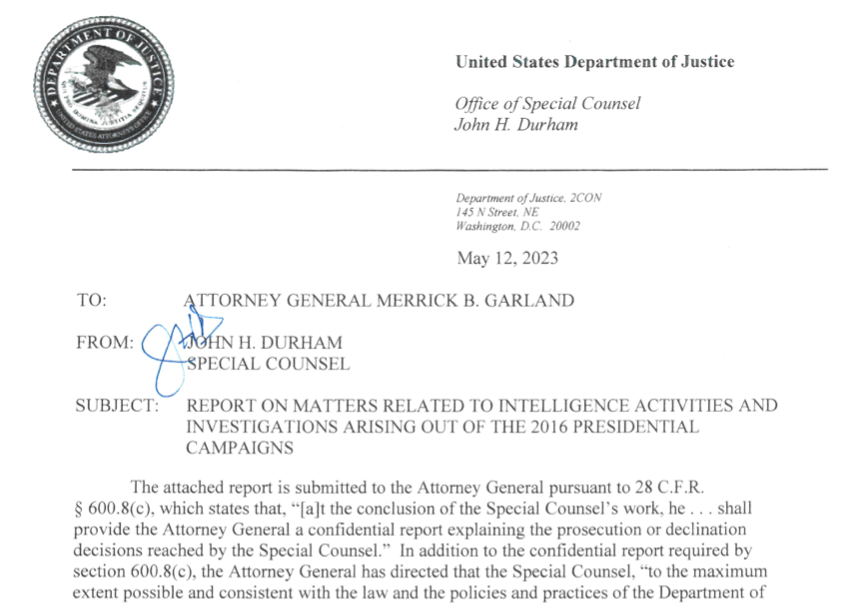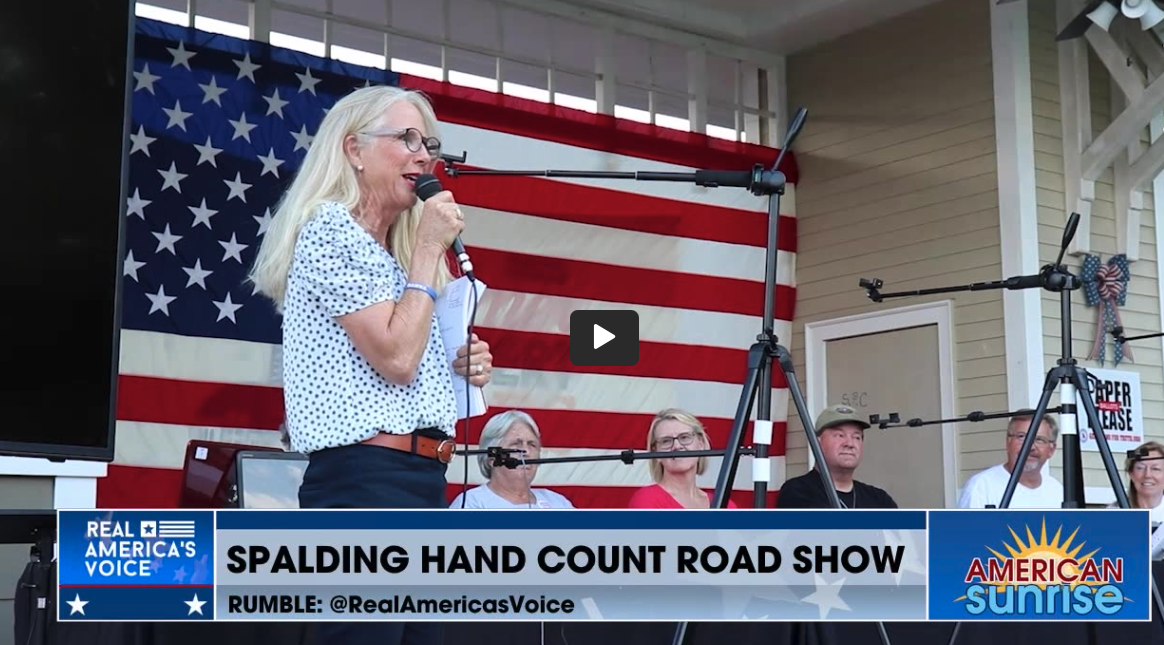John Durham released his full 316-page report on May 15, 2023. You can read the full report entitled “REPORT ON MATTERS RELATED TO INTELLIGENCE ACTIVITIES AND INVESTIGATIONS ARISING OUT OF THE 2016 PRESIDENTIAL
CAMPAIGNS” on the DOJ website here. Just in case that ever gets scrubbed, a web archive version is located here.
Here are some highlights from the first 54 pages of the report.
Page 4: “The Office’s investigation was broad and extensive. It included investigative work both domestically and overseas. It entailed obtaining large document productions from businesses, firms, government agencies, universities, political campaigns, internet service providers, telephone companies, and individuals.”
Universities? Curious.
Page 4 stats and scope of the investigation: “The Office interviewed hundreds of individuals, many on multiple occasions. The Office conducted the majority of interviews in classified settings; for some interviewees and their counsel security clearances needed to be obtained. The Office conducted interviews in person and via video link, with the vast majority of the latter occurring after the COVID-19 pandemic-related closures began in March 2020. Although a substantial majority of individuals voluntarily cooperated with the Office, some only provided information under a subpoena or grant of immunity. Some individuals who, in our view, had important and relevant information about the topics under investigation refused to be interviewed or otherwise cooperate with the Office. As of April 2023, with two trials completed, the Office has conducted more than 480 interviews; obtained and reviewed more than one million documents consisting of more than six million pages; served more than 190 subpoenas under the auspices of grand juries; executed seven search warrants; obtained five orders for communications records under 18 U.S.C. § 2703(d); and made one request to a foreign government under a Mutual Legal Assistance Treaty.”
Pages 7-8 explain exactly what was being investigated (what follows is a direct quote):
- Was there adequate predication for the FBI to open the Crossfire Hurricane investigation from its inception on July 31, 2016 as a full counterintelligence and Foreign Agents Registration (“FARA”) investigation given the requirements of The Attorney General’s Guidelinesfor FBI Domestic Operations and FBI policies relating to the use of the least intrusive investigative tools necessary?
- Was the opening of Crossfire Hurricane as a full investigation on July 31, 2016 consistent with how the FBI handled other intelligence it had received prior to July 31, 2016 concerning attempts by foreign interests to influence the Clinton and other campaigns?
- Similarly, did the FBI properly consider other highly significant intelligence it received at virtually the same time as that used to predicate Crossfire Hurricane, but which related not to the Trump campaign, but rather to a purported Clinton campaign plan “to vilify Donald Trump by stirring up a scandal claiming interference by Russian security services,” which might have shed light on some ofthe Russia information the FBI was receiving from third parties, including the Steele Dossier, the Alfa Bank allegations and confidential human source (“CHS”) reporting? If not, were any provable federal crimes committed in failing to do so?
- Was there evidence that the actions of any FBI personnel or third parties relating to the Crossfire Hurricane investigation violated any federal criminal statutes, including the prohibition against making false statements to federal officials? If so, was that evidence sufficient to prove guilt beyond a reasonable doubt?
- Was there evidence that the actions of the FBI or Department personnei in providing false or incomplete information to the Foreign Intelligence Surveillance Court (“FISC”) violated any federal criminal statutes? If so, was there evidence sufficient to prove guilt beyond a reasonable doubt?
Here is a summary of the next ~50 pages:
- neither U.S. law enforcement nor the Intelligence Community appears to have possessed any actual evidence of collusion in their holdings at the commencement of the Crossfire Hurricane investigation.
- The matter was opened as a full investigation without ever having spoken to the persons who provided the information.
- FBI records prepared by Strzok in February and March 2017 show that at the time of the opening of Crossfire Hurricane, the FBI had no information in its holdings indicating that at any time during the campaign anyone in the Trump campaign had been in contact with any Russian intelligence officials.
- a noticeable departure from how it approached prior matters involving possible attempted foreign election interference plans aimed at the Clinton campaign.
- In the Clinton Foundation matter, both senior FBI and Department officials placed restrictions on how those matters were to be handled such that essentially no investigative activities occurred for months leading up to the election.
- Our investigation determined that the Crossfire Hurricane investigators did not and could not corroborate any ofthe substantive allegations contained in the Steele reporting. Nor was Steele able to produce corroboration for any ofthe reported allegations, even after being offered $1 million or more by the FBI for such corroboration.29 Further, when interviewed by the FBI in January 2017, Danchenko also was unable to corroborate any of the substantive allegations in the Reports. Rather, Danchenko characterized the information he provided to Steele as “rumor and speculation”30 and the product ofcasual conversation.
- beginning in March 2017, the FBI engaged Danchenko as a CHS and began making regular financial payments to him for information – none of which corroborated Steele’s reporting.
- the FBI knew in January 2017 that Danchenko had been the subject of an FBI counterintelligence investigation from 2009 to 2011…. However, the investigation into Danchenko was closed in March 2011 after the FBI incorrectly concluded that Danchenko had left the country and returned to Russia.
- Our review found no indication that the Crossfire Hurricane investigators ever attempted to resolve the prior Danchenko espionage matter before opening him as a paid CHS. Moreover, our investigation found no indication that the Crossfire Hurricane investigators disclosed the existence of Danchenko’s unresolved counterintelligence investigation to the Department attorneys who were responsible for drafting the FISA renewal applications targeting Carter Page. As a result, the FISC was never advised of information that very well may have affected the FISC’s view of Steele’s primary sub-source’s (and Steele’s) reliability and trustworthiness.
- Our investigation, however, revealed that it was Dolan, not Danchenko, who actually interacted with the hotel staff identified in the Steele Reports, so between the two, Dolan appears the more likely source ofthe allegations. When interviewed by the Office, Dolan admitted that he fabricated the allegation about Manafort that appeared in the Steele Report. Our investigation also revealed that, in some instances, Dolan independently received other information strikingly similar to allegations that would later appear in the Steele Reports. Nevertheless, when interviewed by the FBI, Danchenko denied that Dolan was a source for any information in the Steele Reports. The FBI interviewed hundreds of individuals through the course ofthe Crossfire Hurricane and later investigations, and yet it did not interview Dolan as a possible source of information about Trump. Our investigators interviewed Dolan on several occasions, as well as the two other persons mentioned by Steele. Dolan initially denied being a source o f information for the Steele Reports. When, however, he was shown a particular Steele Report relating to Paul Manafort and his resignation as Trump’s campaign manager, along with related emails between himself and Danchenko in August 2016, he acknowledged that the reporting mirrored the information he had provided to Danchenko. Dolan acknowledged to the Office that he fabricated this information.
- the investigation revealed that, instead of taking even basic steps, such as securing telephone call records for either Danchenko or Miilian to investigate Danchenko’ s hard-to-believe story about Millian, the Crossfire Hurricane investigators appear to have chosen to ignore this and other red flags concerning Danchenko’s credibility, as well as Steele’s.
- On October 31, 2016, less than two weeks before the election, the New York Times and others published articles on the Alfa Bank matter and the Clinton campaign issued tweets and public statements on the allegations of a secret channel of communications being used by the Trump Organization and a Russian bank – allegations that had been provided to the media and the FBI by Fusion GPS and Sussmann, both of whom were working for the Clinton campaign.
- These considerations, as explained below, led the Office to charge three individuals with making false statements. The Office considered whether other individuals, including individuals in the government, made false statements to the FBI, the OIG, or congressional committees or whether, during the course of the Office’s investigation, other individuals interviewed either omitted material information or provided false information. Again, what is stated in the Mueller Report is also true for our investigation:
- Applying the Principles of Federal Prosecution, the Office did not seek criminal charges against any individuals other than those listed above. In some instances, that decision was due to evidentiary hurdles to proving falsity. Inothers, the Office determined that the witness ultimately provided truthful information and that considerations of culpability, deterrence, and resource preservation weighed against prosecution.
- The Office determined that other matters it investigated either did not involve the commission ofa federal crime or that our evidence was not sufficient to obtain and sustain a criminal conviction.
- In addition to its prosecution and declination decisions, the Office made the following referrals to other entities:
- A referral on June 30, 2020 to the FBI’s Washington Field Office (“WFO”) regarding a matter related to an existing counterintelligence investigation.
- A referral in December 2020 to OI of information relevant to the accuracy of information contained in four non-Page FISA applications. Referrals oftwo matters on December 14, 2022 to the Inspector General ofthe Department of Defense with a copy to the General Counsel of the Defense Intelligence Agency. One matter involved the execution of a contract between DARP A and the Georgia Institute of Technology; and a separate matter involved the irregular conduct in 2016 of two former employees of the Department of Defense. A referral to the FBI’s OGC and Inspection Division ofan FBI agent for failing to document properly the known history of Igor Danchenko upon his opening as an FBI CHS.
- A referral to the FBI’s OGC and Inspection Division of the same FBI agent for questionable instructions given to Danchenko regarding the taxability of cash payments made to him by the FBI.

